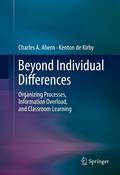
Beyond individual differences: organizing processes, information overload, and classroom learning
Ahern, Charles A.
Kirby, Kenton de
In an era of intense interest in educational reform, spurred by increasing global competition for jobs and advancement, it is more critical than ever to understand the nature of learning. And although much attention is paid to differences between learners, short shrift is often given to cognitive functions that characterize successful learning for all students. Yet these are the very functions that determine the difference between successful and rewarding learning versus merely “doing” without truly learning.. Firmly grounded in the principles of neuropsychology, Beyond Individual Differences analyzes both successful and unproductive learning in terms of the brain’s organizing processes – that is, its unconscious sifting, selecting, and meaning-making that enable students to incorporate and build on what they’ve learned in the past. At the same time, it explores the learning situations that cause organization to break down and offers several preventive strategies. Key areas of coverage include:. The complex role of mental organization in learning and education. Specific organizing processes and the links to success or failure in learning. Information/cognitive overload. The student’s experience of learning and its impact on development. Accommodating a range of individual differences in the classroom. Practices for supporting students’ unconscious organizing processes. Beyond Individual Differences is essential reading for a wide range of professionals and policy makers as well as researchers and graduate students in school and clinical child psychology, special and general education, social work and school counseling, speech therapy, and neuropsychology. Empowers school psychologists and educators to increase students’ curiosity, interest, and investment in learning. Illuminates a much-overlooked foundational element of the conditions that enable learning. Unites empirical neuroscientific data with highly practical educational intervention methodology. Identifies the most common and the most subtle signs of cognitive overload. Provides a unique perspective for understanding all students—from severely impaired to highly gifted—and for developing individualized intervention strategies as needed. INDICE: Preface. Acknowledgments. Part I: Doing Without Learning. Chapter 1: A Riddle. Chapter 2: Below the Surface—An Introduction to Mental Organization. Chapter 3: At the Time of Learning—The Encoding Process. Chapter 4: How Things Go Wrong—Breakdowns in Organizing Processes. Chapter 5: Learning to Learn—Organization and the Student’s Experience. Part II: Teaching With a New Awareness. Chapter 6: The Role of the Teacher. Chapter 7: Awareness and Sensitivity—Four “Anchors” to Use in the Classroom. Chapter 8: Enlarging the Classroom—Practices for Creating Supportive Conditions. Part III: The Principle View. Chapter 9: How Enlarging the Classroom Makes Room for Variation in Cognitive Capacities. Chapter 10: Two Ways of Understanding Learning—Integrating the Profile and Principle Approaches. Conclusion: Coming to Balance. References.
- ISBN: 978-1-4614-0640-2
- Editorial: Springer New York
- Encuadernacion: Cartoné
- Páginas: 185
- Fecha Publicación: 28/11/2011
- Nº Volúmenes: 1
- Idioma: Inglés
